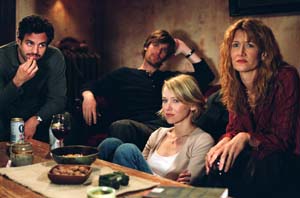WE DON’T LIVE HERE ANYMORE
(director: John Curran; screenwriters: Larry Gross/based on the novellas ”We Don’t Live Here Anymore” and ”Adultery” by Andre Dubus; cinematographer: Maryse Alberti; editor: Steve Smith; music: Michael Convertino; cast: Mark Ruffalo (Jack Linden), Laura Dern (Terry Linden), Peter Krause (Hank Evans), Naomi Watts (Edith Evans), Haili Page (Natasha Linden), Sam Charles (Sean Linden), Jennifer Bishop (Sharon Evans); Runtime: 101; MPAA Rating: R; producers: Harvey Kahn/Naomi Watts/Jonas Goodman; Warner Independent Pictures; 2004)
“Uncompromising in its depiction of two marriages beyond hope.”
Reviewed by Dennis Schwartz
The film is based on two novellas ”We Don’t Live Here Anymore” and ”Adultery” by the late Andre Dubus, whose fiction was used a few years ago for “In the Bedroom.” The American director John Curran (“Praise”) helms this adult drama about adultery, that because of its serious nature and unwillingness to soften the melodrama seems more like a foreign film than an American. It’s set during the summer in a small college town in the state of Washington, where Terry and Jack Linden (Laura Dern and Mark Ruffalo) reside with their two young children Natasha and Sean (Haili Page and Sam Charles). Their closest friends are Edith and Hank Evans (Naomi Watts and Peter Krause), also a thirtysomething couple, who have a young daughter named Sharon (Jennifer Bishop). Jack is a literature professor and Hank teaches creative writing at the same local college. What they also both have in common is an unhappiness with their lives and a realization that their marriages have hit a crisis point of no return.
Terry yearns to be a good wife but is a lousy homemaker driven to drink, often leaving the children uncared for (even though she loves them very much), who is visibly upset that her hubby lost interest in her and is having an affair with Edith. Jack is a duplicitous character who is great with the children but treats Terry without warmth and love. Edith keeps an immaculate house, but the guilt-ridden woman has lost interest in her lecherous and unfaithful hubby. The self-absorbed Hank is aware that his friend is sneaking off with his wife for sex, but is even more upset that he can’t get his novel published. Though there seems to be little joy in the diffident Hank, he does seem to take pleasure having sex with his friend’s wife as a means of revenge.
The story is character driven, and the sharply written script by Larry Gross pinpoints how cruel to each other are these otherwise seemingly civilized sophisticates. They are all willing to be deceptive to get what they want and could care less how the other feels. To get to know them is to see how disconnected they have become from their emotions and humanity. Jack in a pretentious way draws parallels to his life in Leo Tolstoy’s The Death of Ivan Ilyich — a novel he is teaching this semester. Hank treats everyone he meets as a competitor, but is so lacking in true feelings that he’s willing to befriend even those he doesn’t like. While both women desire to be wanted by someone who loves them, and believe that it is through sex that they will find at least some pleasure in life.
It’s an intense tale of infidelity and betrayal, that is uncompromising in its depiction of two marriages beyond hope and the complexities that are involved in how these flawed individuals cope. The cast does a superb job in drawing out their marital angst, while the director keeps the tawdry situation honest by showing how shallow and poisonously deceptive are these academics. The men are shown to be both inferior teachers and husbands, who have become blinded by their own needs to care about anyone else. While the women are equally despicable, ranging from the distant Watts to the insecure and always harried Dern who face the same problems but with different reactions.
This hard-hitting domestic melodrama is intelligently presented, and despite its gloomy narrative is appealing because it absorbs so many disturbing things about modern marriage without one false note. Though the characters might seem too pronounced to be real and no one but the children can the viewer find any sympathy for, the bad marriage situation remains very real in reflecting all the hurts felt. The marital woes filter down to the perceptive children, who are frightened to observe their parents quarreling and are scared of being abandoned. This makes for powerful cinema that hits a nerve in far too many similar marriages of convenience, and deserves a wider mature audience other than those who will see it as an arthouse film. It deserves to be seen even though its dreary subject matter is not crowd pleasing entertainment and the outrageous behavior of the characters is a definite turnoff.

REVIEWED ON 9/14/2004 GRADE: B-